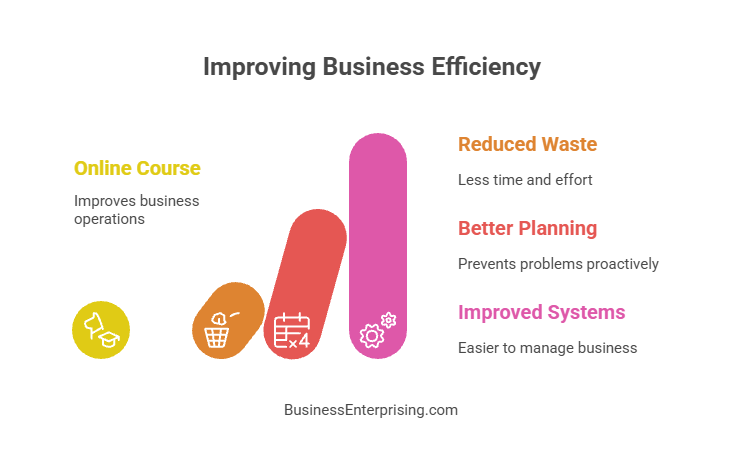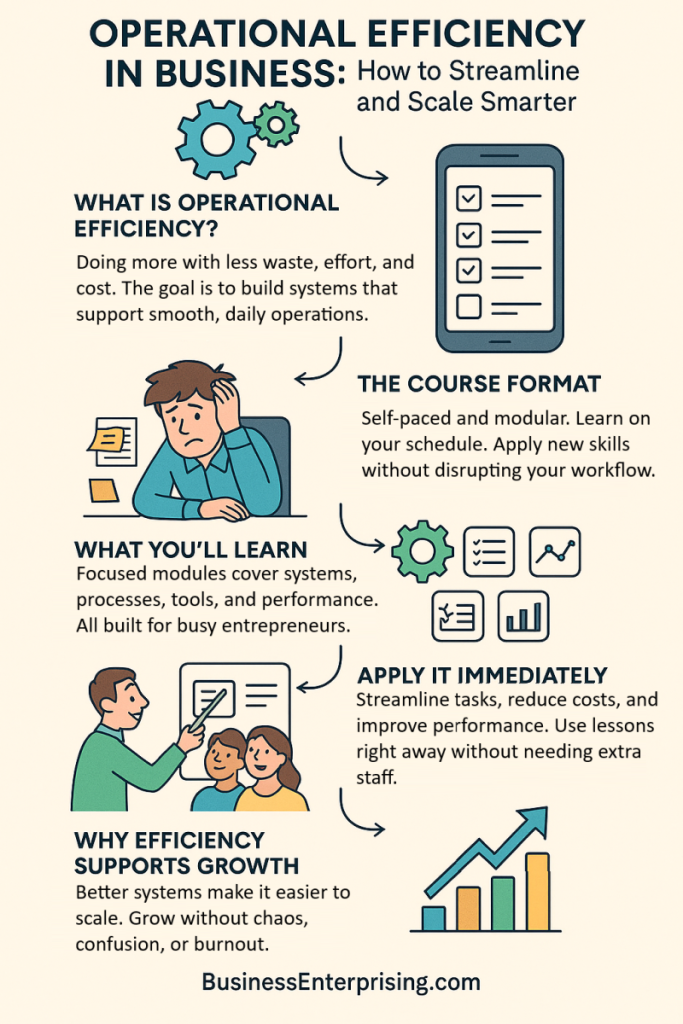 Operational efficiency in business means doing more with less effort. It helps you save time, reduce waste, and stay focused. When systems are tight, your team works better and your costs go down. That kind of structure gives you room to grow without stress.
Operational efficiency in business means doing more with less effort. It helps you save time, reduce waste, and stay focused. When systems are tight, your team works better and your costs go down. That kind of structure gives you room to grow without stress.
Many business owners know something feels off but can’t point to the cause. Tasks take too long, errors repeat, or staff seem overwhelmed. These signs often point to weak processes. However, there are simple ways to fix them without disrupting your entire workflow.
Additionally, strong operations help you plan better. You stop reacting to problems and start preventing them. That shift brings more clarity to your daily decisions. When work flows smoothly, you have more time to lead and think ahead.
This online course was built for busy entrepreneurs who want fast, practical improvements. You learn real-world methods that apply to your business right away. Therefore, you don’t fall behind or waste time on theory.
The lessons are short and focused. You can study between tasks and apply what you learn without delay. Each module targets a specific area like automation, workflow, or team structure. That format helps you focus on what matters most.
If you’re ready to stop putting out fires and start building smarter systems, this course can help. You’ll get tools that support your business goals and free up your time. With better operations, you work with more control and less pressure. That’s how lasting progress begins.
What Operational Efficiency Really Means for Small Businesses
Operational efficiency in business means getting more done with less waste. It involves using your time, money, and team effectively. The goal is simple. You want to produce strong results without draining resources. That balance keeps your business stable and profitable.
Many small businesses struggle with inefficiency. Time gets lost in manual tasks or unclear systems. However, improving operations leads to faster results with fewer mistakes. This shift frees you to focus on growth rather than fixing problems.
Additionally, efficient systems reduce stress. Your team knows what to do and when to do it. That clarity builds confidence and cuts delays. It also keeps your customers happier, since service becomes faster and more reliable.
Profit margins improve when you reduce waste. If you’re spending less to deliver the same value, you keep more of what you earn. Therefore, your business becomes stronger without needing more sales.
You don’t need to overhaul everything to make a difference. Often, small changes bring quick wins. You might adjust how tasks are tracked or how decisions are made. Over time, these changes build momentum.
Additionally, operational efficiency helps you prepare for growth. With better systems, you scale without falling apart. That foundation supports hiring, expansion, and higher demand.
When your operations run smoothly, your business becomes easier to manage. You gain time, save money, and improve consistency. Therefore, you can shift from reacting to planning ahead. That kind of control helps your business grow in a steady, sustainable way.
Common Signs Your Business Is Running Inefficiently
Inefficiency can creep into your business without warning. You may notice small delays, repeated errors, or constant last-minute fixes. Over time, these patterns hurt both performance and morale. However, you can spot early signs and take action before problems grow.
One red flag is wasted time. If you or your team spend hours on tasks that add little value, something’s off. Rework is another signal. When mistakes lead to do-overs, you lose money and customer trust. Therefore, look for repeated corrections or unnecessary steps.
Additionally, high overhead costs often point to inefficiency. If your expenses keep rising without better output, systems may need review. Bottlenecks in your workflow can also slow growth. When work piles up at one point, progress stalls everywhere.
Employee burnout is another warning sign. When your team feels overwhelmed or unclear about priorities, performance suffers. People work harder but get less done. That pressure leads to turnover, missed deadlines, and a negative atmosphere. Therefore, it’s important to check in often and look for signs of frustration.
Operational efficiency in business helps prevent these issues. When your systems support the work, your team stays focused. You meet goals with less effort and more clarity. Additionally, small changes to process or structure can remove daily stress.
You don’t need to solve everything at once. Start by identifying your weakest points. Then fix one area and move on to the next. With steady effort, you regain control and build stronger habits. Over time, your business becomes easier to run and more consistent.
How the Online Course Is Structured for Busy Entrepreneurs
Running a business takes time and focus. That’s why this course was built to work around your schedule. You don’t need to commit to long hours. The structure is flexible and designed for people managing real operations every day. The course uses a self-paced format. You can start when ready and move at a speed that works for you. Each section is short and clear. Therefore, you can complete a lesson over coffee or between meetings. You won’t fall behind if life gets busy.
Additionally, the course is divided into small modules. Each module covers one concept or process. That way, you focus on what matters most without extra fluff. You can choose where to start and skip what you already know. The full course takes only a few hours to complete. However, you can stretch it over several days or weeks. There are no deadlines or fixed class times. That freedom makes it easier to stick with and finish.
You apply what you learn in real time. Therefore, the impact is immediate and useful. You can use each module to spot weak points and improve results fast.
Operational efficiency in business requires more than theory. It takes real-world methods that work under pressure. This course gives you tools you can use without disrupting your routine. Additionally, you get the support you need without slowing down your day. You stay in control of both your time and your learning. That setup keeps your business moving while you make steady improvements.
Key Topics Covered: Systems, Processes, and Productivity Tools
This course focuses on systems that keep your business running without wasted time or energy. You learn how to organize daily work. The first module covers automation. You discover simple ways to reduce manual tasks and free up time. Therefore, you can shift your energy toward higher-level decisions.
Additionally, the course explains how to build standard operating procedures. SOPs create structure and cut down on mistakes. They help your team follow the same steps every time. That consistency improves results and saves time with training.
You also learn the basics of project management. The course walks you through setting priorities, assigning tasks, and tracking deadlines. These tools help you move projects forward without confusion or delay. Therefore, you get more done with less back and forth.
Another key topic is performance metrics. You learn how to measure what matters. That includes tracking time, output, and cost. These numbers give you a clear picture of what works and what needs fixing. Additionally, metrics help you adjust plans with confidence.
Operational efficiency in business depends on the right tools and habits. This course shows you how to build both. Each topic is covered in short lessons with real examples. You can apply them right away and see quick results.
You don’t need special software or expensive tools. The focus is on simple methods that work in small businesses. With each module, your systems improve. Over time, your business runs more smoothly and with less stress. That stability sets the stage for steady growth.
Real-World Applications for Immediate Operational Improvements
The goal of this course is simple. Help you fix what’s slowing your business down. You start by learning practical tools. Then you apply them to your daily work. That way, you see results without waiting months.
You can begin by streamlining repetitive tasks. The course shows how to use basic automation tools. Therefore, you spend less time on routine work. That time adds up quickly and gives you space to focus on growth.
Additionally, the course helps reduce costs by finding waste. You learn how to track small inefficiencies that lead to lost money. That might include unused tools, unclear roles, or poor task planning. Fixing those areas leads to better use of your budget.
Team performance improves when roles and systems are clear. You can apply what you learn to create checklists, timelines, and simple project plans. Therefore, your team knows what’s expected and works with fewer delays.
The course is built to support operational efficiency in business from the first module. You apply new habits as you go. That makes the training part of your actual workflow, not something extra on your list.
Additionally, many students use these ideas to prepare for hiring or scaling. When your systems run well, you avoid problems during growth. Your team works better and your clients feel the difference.
Each step leads to stronger habits and fewer setbacks. You fix what matters most without changing everything at once. That kind of steady progress helps you stay organized, reduce pressure, and build lasting improvements into your operations.
Why Operational Efficiency Helps Scale Your Business Faster
Growth often brings new challenges. Without strong systems, small problems grow with your business. That’s why operations matter more as you scale. When you run things efficiently, growth becomes a structured process, not a daily scramble.
Operational efficiency in business means your systems support expansion instead of breaking under pressure. You avoid constant rework and keep your team focused. Therefore, you spend less time fixing mistakes and more time planning ahead.
Additionally, when your processes are clear, new hires learn faster. You don’t rely on guesswork or memory. Instead, your team follows steps that already work. That consistency reduces stress and builds trust across your business.
Cost control also improves with tighter operations. As you scale, small savings add up. You stay lean while reaching more people. Therefore, your profits grow without raising your prices or adding more pressure to your team.
Efficient systems also create space for better decisions. You aren’t distracted by daily chaos. Instead, you track results, adjust plans, and lead with more clarity. That structure helps you grow with purpose, not by chance.
Additionally, you improve how your team communicates. Clear workflows reduce friction and confusion. That helps keep people aligned and productive. It also supports faster service and better client experiences.
Scaling a business is easier when your operations are strong. You move forward without losing control or burning out. Each part works together to support long-term goals. That steady foundation gives you the confidence to grow with focus and direction.
Conclusion
Strong operations make your business easier to run. You save time, reduce mistakes, and keep your team focused. That structure creates less stress and more progress. You don’t need a complete overhaul to see results. Small changes often lead to big improvements. Additionally, learning how to fix weak spots helps you avoid repeating the same mistakes. You get tools that improve how work gets done. That makes daily operations more predictable and less reactive. Over time, your business becomes more consistent and easier to scale.
This course was built for real-world use. You learn at your own pace and apply each lesson to your business. Therefore, you improve while staying active in your day-to-day work. That balance helps you make lasting changes without slowing down. Operational efficiency in business is not about working harder. It’s about working smarter with fewer delays, less waste, and more clarity. You gain better habits that support long-term growth.
Additionally, efficient systems make your team stronger. People know what to do and how to do it. That stability builds trust and keeps work flowing. You avoid last-minute pressure and get more done with less effort. When operations improve, everything else follows. Sales grow, service improves, and your goals feel more reachable. You lead with confidence because your business runs on clear systems. If you’re ready to fix what slows you down, now is a good time to start. With the right structure, your business can grow faster and with less friction. Take the next step and make progress that lasts.



